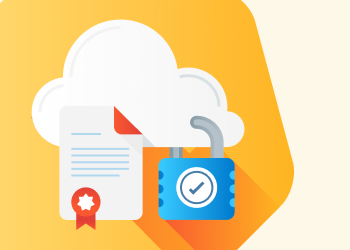Concerns about storage security in cloud computing persist, and rightly so. While millions of individual users and a staggering 87% of enterprises worldwide continue to benefit from the ease of cloud storage, even big names like Microsoft, LinkedIn, Yahoo and Apple have become victims of cloud security breaches.
This article explains how to respond to these threats. The tips are broken into two categories: First, those for IT industry "pros," and second, ones that regular end-users can follow.
Common Concerns about Security in Cloud Storage
The most widespread concerns in connection to cloud computing are data breaches, malware injections, permanent and complete loss of data, system vulnerabilities, and the misuse of information through insider threats. According to a survey conducted by Bitglass (a cloud data security company), users believe that the biggest threat to storage security in cloud computing is unauthorized access to private information, while the possibility of account hijacking is also a major cause for alarm.
Further reading Securing Your Digital Data: Achieving Cyberstorage Today
Tips on How to Secure Your Cloud Storage
Public cloud storage options are subject to a wide array of risks. Fortunately, achieving secure data cloud storage is possible. Here are a few of the most proactive tips that you can use to enhance the safety of your cloud computing experience, for both professionals and end-users.
Effective Password Management and Two-Factor Authorization
Pro: Enterprises have to manage multiple employee accounts, which can make it difficult to develop foolproof security frameworks. However, with password management tools, you can manage and develop strong passwords for all users that are part of your network. For truly secure online cloud storage, it is critical to reset passwords every few months, or whenever an employee departs from the firm.
End Users: For end-users, perhaps the most widely used trick for ensuring data storage security in cloud computing is creating difficult-to-guess passwords, and then remembering them. But remember: Longer passwords aren’t necessarily stronger passwords; in fact, moving beyond 16-20 characters is ineffective. If the number of passwords you need to manage continues to increase (along with the stress of keeping track of them), then check out services like LastPass, which can handle password creation and storage for you. Make sure, however, to remember your master password, and keep the record of it somewhere other than on your computer.
Select Cloud Storage with Data Encryption Features
Pro Encrypted data or ciphertext is information translated into another code or form. It is an effective form of data security because once encrypted, data can only be decrypted by those who hold a secret key or password. Some of the most well-known professional and secure encrypted cloud storage services include Amazon S3, Google Cloud Storage, and Microsoft Azure. Another suggested tip: Implement client-side encryption, which is executed from the sender’s end before the transmission of information to secure cloud storage. As another option, you can also opt for strong server-side encryption for secure data storage in cloud computing by employing third-party cloud backup solutions.
End Users: Server-side encryption for secure online cloud storage is provided by such popular services as Google Drive, Microsoft OneDrive, and Amazon Drive, so users’ data is encrypted when it is stored in data centers and is decrypted when a user seeks to access it through a private key. This adds an extra layer of security to safeguard sensitive information.
Limiting Access for Different Users
Pro: Ensuring data storage security in cloud computing is fundamental in organizational setups because any data breach puts the information of hundreds, thousands or even millions of users at risk. Therefore, IT leads must certify that third-party cloud vendors and staff members are only granted the rights to access the data they need to perform their jobs.
End Users: Secure online cloud storage makes sharing easy. But if you are looking to give some of your cloud storage to a friend or family member, it’s a best practice to review your sharing settings and set up separate accounts, rather than depositing all files in a single account.
Keep Additional Copies of Your Files
Pro: When creating duplicate copies of important data, it is highly recommended that you set up production-level local storage, especially if you need secure online cloud storage for enterprise environments. (For more information, check out this article)
End Users: Individual users must secure all their data by creating copies and backing them up on external drives in case of any unforeseen problems, such as file corruption, hard drive damage or failure, device theft, etc.
Further reading Cyberstorage and Immutable Data: A Match Made in Heaven
Conclusion
In the digital age, data is king. From social media photos to credit card numbers and even property documents, a growing number of users prefer to utilize secure cloud data storage to meet their backup storage needs. The Internet continues to evolve, and it is in your best interest to stay connected and informed.
Be sure to read user agreements, terms and conditions thoroughly before signing up for any cloud storage service. You need to know how your data is stored and the rights you hold as a consumer. Never take data security for granted. Be prudent, and be safe!





